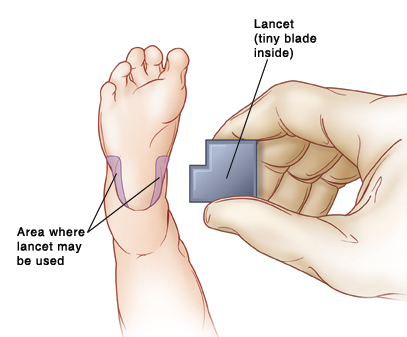Blood Sugar Monitoring and Treatment in the NICU
Blood Sugar Monitoring and Treatment in the NICU
Blood sugar is the amount of sugar in the blood. The body needs sugar to function. Blood sugar must stay within a certain range for the body to be healthy. A body chemical (hormone) called insulin helps the body maintain a normal blood sugar level. In many newborns, blood sugar is either too high or too low. So doctors will carefully watch your baby’s blood sugar level during his or her stay in the neonatal intensive care unit (NICU). If your baby's blood sugar is too high or too low, treatment will bring it back under control.
Why is my baby’s blood sugar abnormal?
-
Low blood sugar is common in many babies right after birth, as the baby’s body gets used to regulating its blood sugar level without help from the mother’s body.
-
Infants of mothers who have diabetes may have more difficulty regulating their blood sugar.
-
High blood sugar can be caused by illness or stress. It’s also common in preemies born very early, because the organ that makes insulin (pancreas) is not fully developed.
How is blood sugar monitored?
A healthcare provider uses a tiny blade (lancet) to take a drop of blood from your baby’s foot. The blood is put on a small test strip. This measures the sugar in the drop of blood.

How are blood sugar problems treated?
-
If blood sugar is too low, you may feed your baby more often. The natural sugar in your breastmilk or formula helps raise blood sugar level. A healthcare provider may also give your baby supplemental sugar (glucose) through an IV (intravenous) line.
-
If blood sugar is too high, a healthcare provider may give your baby insulin. This helps the baby's body use up more of the sugar in the blood. If the baby is being fed through an IV, a healthcare provider may also lower the amount of glucose in the IV fluid. But babies need some sugar to grow and develop as they should. They cannot have all the glucose removed from their feeds.
Does my baby have diabetes?
In adults, blood sugar problems are often caused by diabetes. If a mother has diabetes, her baby is more likely to have temporary low blood sugar at birth. The problem continues until the baby’s pancreas adjusts to his or her normal blood sugar level. But the blood sugar problem your baby has does NOT mean your baby has diabetes. If your baby has low or high blood sugar as a newborn, it does not mean that your baby is likely to grow up to have diabetes, either.
Updated:
March 16, 2019
Sources:
Adamkin, DH. Postnatal Glucose Homeostasis in Late-Preterm and Term Infants, Pediatrics (2011); 127(3)l pp. s575-s579, Core Curriculum for Neonatal Intensive Care Nursing, 4th ed. Hyperglycemia Nursing Consult, Core Curriculum for Neonatal Intensive Care Nursing, 4th ed. Hypoglycemia Nursing Consult, Standards of Medical Care in Diabetes - 2016. American Diabetes Association.
Reviewed By:
MMI board-certified, academically affiliated clinician,Trevino, Healther, M., BSN, RNC